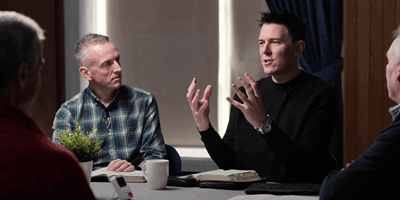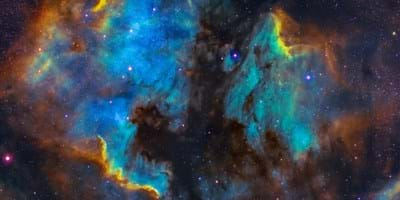What is the Big Bang?
The Big Bang is a theory, a very popular one, which many people believe explains how the universe came into being, indeed how everything began about 13.7 billion years ago. It proposes that one really tiny speck of something suddenly began expanding in what resembled a really big explosion or “big bang”.
Why is it called the Big Bang?
Isn’t it odd that what claims to be a scientific theory for such a hugely significant event has such an ordinary, colloquial name? Well, as usual, history is to blame!
In the 1920s, Edwin Hubble obtained evidence of an expanding universe, and of galaxies separating from each other. A Belgian physicist, George Lemaitre, then proposed that, going backwards in time (extrapolating backwards), everything would have come from something much smaller, which would have come from something smaller still, and so on. Scientific thinking using Einstein’s equations of general relativity allowed this.
Now the rather unscientific name came from another scientist who believed that the universe had no beginning, that it was eternal. Astronomer Fred Hoyle said that it was irrational that "all matter of the universe was created in one big bang at a particular time in the remote past". That was in 1949. His criticism did not survive but the name he gave to the theory has stuck!
So how does this Big Bang Theory explain things?
It is now well established from astronomy and physics that the universe did have a beginning. Before then there was nothing; after that there was something which eventually became our universe. The Big Bang Theory sets out to explain what happened during and after that moment.
All this is obviously outside of our experience, and also much of it is beyond anyone’s understanding. So some special concepts have been introduced. The chief of these is called a “singularity”, now recognized terminology in this realm of science.
But we don’t really know what a singularity is because it does not conform to our present knowledge of science! We are told it is related to what is at the core of “black holes” where intense gravitational pressure squeezes things so much that they gain infinite density. So we get the idea that our universe began as an infinitesimally small, infinitely hot, infinitely dense “singularity”. The theory cannot say where it came from, nor why it appeared, nor why it suddenly began to expand.
Anyway, we are told that as it expanded it began to cool. Then, over long periods of time, elements like hydrogen and helium formed, gravity took over, heavier elements formed, then stars and galaxies, to become this universe as we know it, where expansion and cooling both continue. And where we are living!
A further development of the theory in the early 1970s has included studies of time and space. These have led to the conclusion that it was not only the material universe and all its energy which had a beginning in that singularity, but time and space began then also. It postulates that everything began then!
So, according to the Big Bang theory –
before the singularity –
nothing existed,
no space, no time, no matter, no energy,
nothing.
All that and so much more is hard to imagine, is it not? For example, where did the singularity come from? Where did it appear if not in space? What drove the change?
We don't know. Science has no answers to these questions.
What we do know is that we are here in a universe which at one time didn't exist. But it had a beginning and so had each of us, amazingly conscious creatures living on a uniquely balanced planet, orbiting a large, life-sustaining star, clustered together with billions of other stars in a galaxy called the Milky Way, swirling through the cosmos, all of which is inside an expanding universe of staggering dimensions.
Did it all begin as an infinitesimally tiny speck, a singularity, something we don’t understand, which appeared out of nowhere, by means of an unknown mechanism, and for reasons unknown?
So says the Big Bang Theory. Perhaps you are one of those who say, “We do not understand it all, but we believe it happened. We don’t have a better explanation.”
A better explanation?
I would like to take you to the very first verse in the Bible, Genesis 1 verse 1:
In the beginning God created the heavens and the earth.
Long before science established and declared that the universe had a beginning, the Bible had said so. Isn’t that interesting? And in these few words are the five basics upon which science is based:
“In the beginning” – time
“God” – intelligence
“created” – energy
“the heavens” – space
“and the earth” – matter
Now, if you go on and read through the rest of Genesis 1, you must remember that it was written to be understood by people who lived long before a scientific language had been invented, and long before a scientific age posed questions and criticisms. For it was written, not to teach science and cosmology, but to tell us about God and what He did.
The creation account in Genesis 1 describes progressive stages by which almighty God prepared a world suitable for man to live in. From emptiness and chaos, God created an environment ideal for the people He had in mind, to live a full and fulfilling life in fellowship with Himself and with others. When it was finished, God rested in fellowship with the man He had created. It was “very good”, He said.
The general picture is clear to you, as it was to those who read it long ago – in the centuries BC, in the Dark Ages and the Middle Ages, during most of the centuries AD, in fact to most people today.
Another dimension
From its first chapter, the Bible takes you forward into another dimension outside of science, a non-material dimension, but a real one, a spiritual one. We are introduced to a spiritual being called God. He is the Creator of everything, while He Himself is uncreated and eternal. Fact and logic requires a creator for created things, whatever they are.
What we know about an expanding universe, its background microwave radiation and similar phenomena – could these not be the afterglow of God’s almighty creative acts “in the beginning”? You could think about it as God’s fingerprints left on His great handiwork, leading us to seek and find Him.
He wants us to know Him, to know about His greatness and His power, and His love and His compassion too. He made that possible by sending His Son, Jesus Christ into our world, eventually to die on a cross for our sins, and remove that barrier that would keep us away from Him. The Bible says that eternal life is to know the only true God, and Jesus Christ whom He sent (read this in John 17 verses 1-3).
The Big Bang theory leaves many questions unanswered, scientific ones and everyday ones. This Bible-based story of creation contains a logical cause for the universe, for planet earth and its countless living things, and a great reason for you and me being here just now.
God is calling us to Himself and to eternal life.































